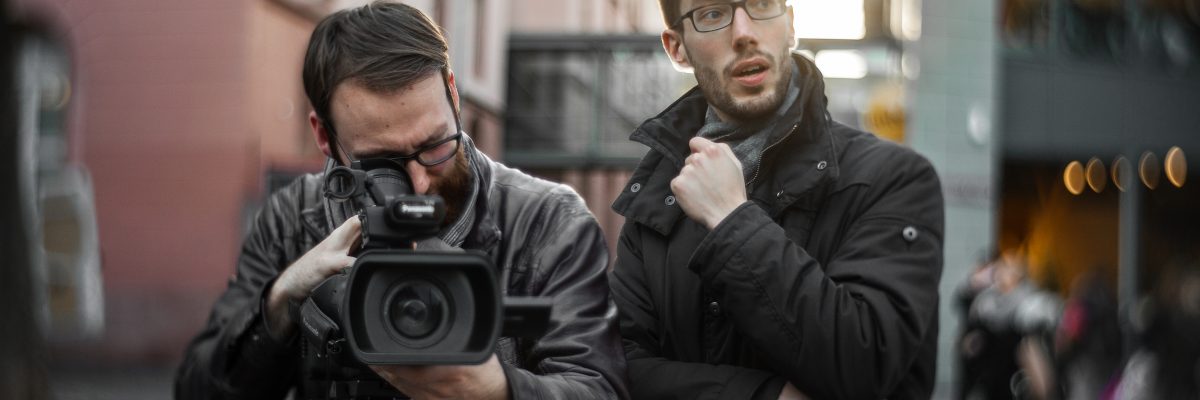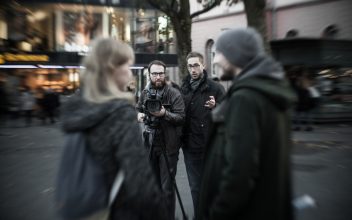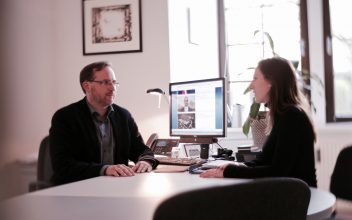
Core competencies for the working world of today and tomorrow— the Bachelor’s Minor in Audio-visual Publishing
The Bachelor’s Minor in Audio-visual Publishing combines the expertise of a major with the media-specific knowledge of audio-visual design. Whether they are journalists, political scientists, physicists or film scholars, students learn in six semesters how to use contemporary audio-visual media to present complex topics in an attractive way for a broad audience. Basic journalistic knowledge is also the foundation here. Due to high demand, the freshly reaccredited program has accepted 48 first-year students each year since fall 2019 instead of the previous 16.
Module 1: Fundamentals of Audio-visual Publishing I
Your AVP studies begin in the first semester with the basics of journalistic work as well as the technical know-how you need to use cameras and editing programs. The goal is for you to be able to independently produce basic audio-visual content after the first semester: from research to treatment and shooting to post-production. This practical part is based on the principles of video journalism (VJ). In addition, you will get to know the first possibilities of multimedia design, e.g. for the design of websites.
The lecture course Fundamentals of Audio-visual Journalism conveys the theoretical and practical basics of Audio-visual Publishing. You will receive a profound overview of, for example, camera, editing and sound technology, as well as topic identification, research and interviewing. You will also learn to distinguish between the various journalistic formats and forms of presentation in both traditional and digital media. In the Journalistic Work seminar, the focus is on journalistic quality criteria, especially on research techniques as well as legal and ethical issues in this context. In small groups, you will develop and produce your own audio-visual contributions and practice using cameras and editing software.
Module 2: Fundamentals of Audio-visual Publishing II
In the second fundamentals semester, theoretical and practical knowledge is further deepened, and an emphasis of your choice is taken. The choices here are: Outdoor Production (camera, lighting, sound), Indoor Production (editing, post-production, sound mixing), or Interactive Media (web-specific production systems). The in-depth course takes place in the workshop course Advanced Audio-visual Production. In addition to the technical aspects, each of these courses also provides a feel for working with different formats of video journalism.
In the seminar Introduction to the Analysis of Audio-visual Media Contributions, you will learn to describe and compare different audio-visual forms of presentation, their logic and function, as well as their historical development and aesthetics. The focus of the seminar is on practicing a conscious, critical and differentiated analysis of journalistic, non-fictional and fictional audio-visual media products. The knowledge acquired here will also benefit you in the production of your own audio-visual content.
Module 3: Media and Communication Competence – Theoretical Deepening and Specialization
From the third semester onwards, you will both participate in the Campus Media’s editorial team trainings (see Modules 5 + 6) and, in parallel, deepen your theoretical knowledge in the area of media and communication competence in Module 3. Depending on your core subject and interests, you can choose between four different elective modules for the 3rd and 4th semesters and opt for two of the following modules:
In Module 3a: Communication Science Aspects of Audio-visual Media (not selectable for students majoring in Communication Science (Publizistik), you will deal with the basic theories, terminology and empirical methods of communication science, especially with reference to reception and impact research.
In Module 3b: Image and Film Studies Aspects of Audio-visual Publishing (not selectable for students majoring in Film Studies, Theatre Studies or Cultural Anthropology as core subjects) offers you an insight into film history, theory and aesthetics. You will analyse and interpret fictional films based on the insights, terminology, and methods of film studies.
In Module 3c: Documentary Aspects of Audio-visual Publishing, you will reflect on the special features of documentary and journalistic productions in all their diversity. Based on documentary theory, it offers you an overview of the history and present of documentary work.
In Module 3d: Science Communication, you will learn theories, topics and techniques of science communication and presentation. You will deal with terminology and methods for analysing audio-visual productions in the field of science communication, especially science journalism.
Module 4: Media and Communication competence
In semesters 5 and 6, your study plan includes the courses of Module 4, which will prepare you in the transition from the end of your studies to the professional world.
You will explore and discuss current trends and developments in the Innovations in Audio-visual Production seminar. Currently, such developments include devices for the production and reception of virtual reality content, 360-degree cameras, and cameras for the production of 4K images. The seminar also includes the analysis and evaluation of audio-visual works produced with these technologies, as well as the question of how the latter can be used creatively for your own productions.
In the Communication Competence exercise, you will acquire an understanding of the fundamentals of direct and media-mediated communication, of successful and unsuccessful communication, and of the challenges of imparting knowledge and working in audio-visual production teams. After completing this course, you will be able to moderate and design production processes of audio-visual products in teamwork and to prepare complex issues in a way that is appropriate for the target group. The course content also includes, for example, community management of social media platforms.
Module 5+6: Campus Media I+II
Working for Campus Media constitutes the core of your AVP studies from the 3rd to the 6th semester. In the editorial team trainings, you will plan and carry out audio-visual contributions with different topics and forms of presentation. You will work cooperatively in an editorial team and become familiar with internal editorial processes and routines; this will make your later transition into practice outside the university easier. In the production of audio-visual contributions under editorial guidelines, you will apply your learned craft (outdoor production, indoor production or interactive media) and develop the topics of contributions as an author. Your contributions will be broadcast on the Mainz Public Channel (Offener Kanal Mainz) as well as published on various internet and social media platforms.
Depending on your area of interest, you can choose between different areas of study and also decide whether you want to switch to a different teaching department after two semesters or concentrate on one area and specialize in it over four semesters. You have the choice between:
In Modules 5a + 6a: CampusTV, you will work in the CampusTV editorial team producing audio-visual contributions for broadcasts and/or for distribution via Internet platforms. In doing so, you will take on authorship and/or camera, and editing work, as well as designing sound and lighting if required.
In Modules 5b + 6b: Social Media, you will learn to produce content for social media platforms such as Instagram, YouTube or Facebook independently and as part of a team, as well as to design and publish these in the appropriate format for the corresponding publication channel and to moderate them as part of community management.
The content of Modules 5c + 6c: Science Communication is the audio-visual processing of science and research topics for different publication channels and target groups. The spectrum here ranges from journalistic productions and the communication of research topics to digital knowledge transfer in teaching.
In the Modules 5d + 6d: Documentary Work, you will develop documentary formats for different media platforms. These can be, for example, a classic documentary film, a web documentary or a documentary YouTube channel.
Modules 5e + 6e: The project-focused editorial team trainings offer room for innovation. In addition to the conception, development and experimentation with unusual audio-visual formats (e.g. multimedia, interactive, immersive), investigative journalism and the implementation of data journalistic projects are also possible here.
Taking part of the practice-oriented training in the editorial teams of Modules 5 and 6, you will gain basic journalistic knowledge in workshops, which you will later require to work in editorial teams. This includes topics such as media ethics, research, copywriting, interview techniques, media law and speaking.
In the 5th and 6th semesters (Module 6), you will take on tutoring tasks to help first- and second-semester students in their practical exercises.
Downloads
-
Prüfungsordnung AVP
alter Studiengang, gültig bis SoSe 2019
-
Modulhandbuch AVP
alter Studiengang, gültig bis SoSe 2019
-
Modulhandbuch AVP
überarbeiteter Studiengang, gültig ab WiSe 2019/20
-
Studienverlaufsplan AVP
überarbeiteter Studiengang, gültig ab WiSe 2019/20


